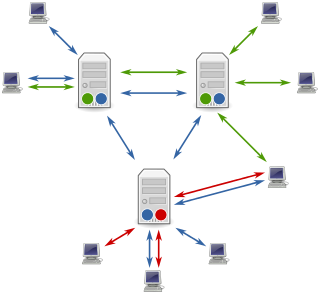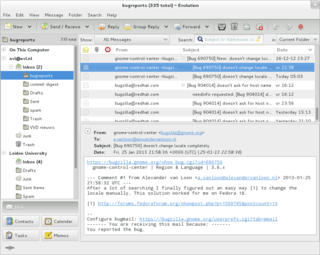
RSS is a type of web feed which allows users and applications to access updates to online content in a standardized, computer-readable format. These feeds can, for example, allow a user to keep track of many different websites in a single news aggregator. The news aggregator will automatically check the RSS feed for new content, allowing the content to be automatically passed from website to website or from website to user. This passing of content is called web syndication. Websites usually use RSS feeds to publish frequently updated information, such as blog entries, news headlines, or episodes of audio and video series. RSS is also used to distribute podcasts. An RSS document includes full or summarized text, and metadata, like publishing date and author's name.

Salon is an American news and opinion website, created by David Talbot in 1995 and currently owned by the Salon Media Group. It publishes articles on U.S. politics, culture, and current events and has a politically progressive, liberal editorial stance. Since 2007, the company has been funded by John Warnock and William Hambrecht, through cash injections.

Phishing is the fraudulent attempt to obtain sensitive information such as usernames, passwords and credit card details by disguising as a trustworthy entity in an electronic communication. Typically carried out by email spoofing or instant messaging, it often directs users to enter personal information at a fake website, the look and feel of which are identical to the legitimate site.

On the World Wide Web, a web feed is a data format used for providing users with frequently updated content. Content distributors syndicate a web feed, thereby allowing users to subscribe a channel to it. Making a collection of web feeds accessible in one spot is known as aggregation, which is performed by a news aggregator. A web feed is also sometimes referred to as a syndicated feed.
FringeWare Review was a magazine about subculture published in Austin, Texas. Many of the publication's writers and editors were associated with other publications such as Boing Boing, Mondo 2000, Whole Earth Review, and Wired. The last issue of the magazine was #14, published in 1998. The magazine had an international circulation, distributed primarily by Fine Print, an Austin-based company that focused on 'zine distribution.
Drowned in Sound, sometimes abbreviated to DiS, is a UK-based music webzine financed by artist management company Silentway. Founded by editor Sean Adams, the site features reviews, news, interviews, and discussion forums.
Digital Spy is a British-based entertainment, television and film website and brand and is the largest digital property at Hearst UK. Since its launch in 1999, 'DS' has focused on entertainment news related to television programmes, films, music and show business to a global audience. Digital Spy now reaches 23 million unique users per month, making it one of the 150 most visited websites in the UK, according to Alexa.

In computing, a news aggregator, also termed a feed aggregator, feed reader, news reader, RSS reader or simply aggregator, is client software or a web application which aggregates syndicated web content such as online newspapers, blogs, podcasts, and video blogs (vlogs) in one location for easy viewing. RSS is a synchronized subscription system. RSS uses extensible markup language (XML) to structure pieces of information to be aggregated in a feed reader that displays the information in a user-friendly interface. The updates distributed may include journal tables of contents, podcasts, videos, and news items.

Conversation threading is a feature used by many email clients, bulletin boards, newsgroups, and Internet forums in which the software aids the user by visually grouping messages with their replies. These groups are called a conversation, topic thread, or simply a thread. A discussion forum, e-mail client or news client is said to have a "conversation view", "threaded topics" or a "threaded mode" if messages can be grouped in this manner.

Valleywag was a Gawker Media blog with gossip and news about Silicon Valley personalities. It was initially launched under the direction of editor Nick Douglas in February 2006. After Douglas was fired, the blog was taken over by Owen Thomas. Thomas himself left in May 2009, to be replaced by Ryan Tate. It was the first to break some stories, such as the leaking of a Gene Simmons sex tape. However, it has been criticized for broadcasting unsubstantiated and damaging gossip about people who are not in the public eye, such as a college intern who falsely called in sick to work and had it publicized across the Internet by Valleywag. The blog ceased operating in February 2011, and the URL began directing to a Gawker page with a selection of technology industry-themed stories.

Digg is a news aggregator with a curated front page, aiming to select stories specifically for the Internet audience such as science, trending political issues, and viral Internet issues. It was launched in its current form on July 31, 2012, with support for sharing content to other social platforms such as Twitter and Facebook.
Zedo is a privately held company founded in 1999 by Roy de Souza, which provides several online advertising products and services to Internet publishers, advertisers, and agencies. The company works with publishers who sell space on their web pages to online advertisers. Zedo's servers send advertisements to users' browsers. Zedo uses an HTTP cookie to track users' browsing history resulting in targeted pop-up ad and pop-under ads. The cookie is often flagged by spyware and adware removal programs. In a 2013 case study written by Amazon, Amazon described ZEDO as a company that "develops innovative technology solutions to help publishers sell and deliver Internet ads".
Klipfolio Inc., is a Canadian software company founded in 2001 and headquartered in Ottawa, Ontario. With the emergence of XML, RSS, news aggregators and widgets in 2001, the company initially focused on the consumer market, and later moved into the dashboard and business intelligence space. On Feb 25, 2015 they announced a series A round of $6.2 million.
A paywall is a method of restricting access to content via a paid subscription. Beginning in the mid-2010s, newspapers started implementing paywalls on their websites as a way to increase revenue after years of decline in paid print readership and advertising revenue. In academics, research papers are often subject to a paywall and are available via academic libraries that subscribe.

Usenet is a worldwide distributed discussion system available on computers. It was developed from the general-purpose Unix-to-Unix Copy (UUCP) dial-up network architecture. Tom Truscott and Jim Ellis conceived the idea in 1979, and it was established in 1980. Users read and post messages to one or more categories, known as newsgroups. Usenet resembles a bulletin board system (BBS) in many respects and is the precursor to Internet forums that are widely used today. Discussions are threaded, as with web forums and BBSs, though posts are stored on the server sequentially. The name comes from the term "users network".
Patrick J. Spain is a serial entrepreneur. He is currently the co-founder and CEO of First Stop Health, LLC., a Chicago-based provider of telemedicine services. He is also the Executive Chairman and co-founder of the news curation site Newser. Spain is the former Chairman and CEO Hoover's, which he co-founded; and the founder and former CEO of HighBeam Research. Hoover's was sold to Dun & Bradstreet in 2003, and HighBeam Research was purchased by Cengage Learning in 2008.
Ashley Madison, or The Ashley Madison Agency, is a Canadian online dating service and social networking service marketed to people who are married or in relationships.

The Gay Nigger Association of America (GNAA) is an Internet trolling organization. They have trolled several prominent websites and Internet personalities including Slashdot, Wikipedia, CNN, Barack Obama's campaign website, Alex Jones, and prominent members of the blogosphere. They have also released software products and leaked screenshots and information about upcoming operating systems. In addition, they maintain a software repository and a wiki-based site dedicated to Internet commentary. They are listed as a far-right cyberterrorist organization in TRAC.
A web beacon is one of various techniques used on web pages and email, to unobtrusively allow checking that a user has accessed some content. Web beacons are typically used by third parties to monitor the activity of users at a website for the purpose of web analytics or page tagging. They can also be used for email tracking. When implemented using JavaScript, they may be called JavaScript tags.













